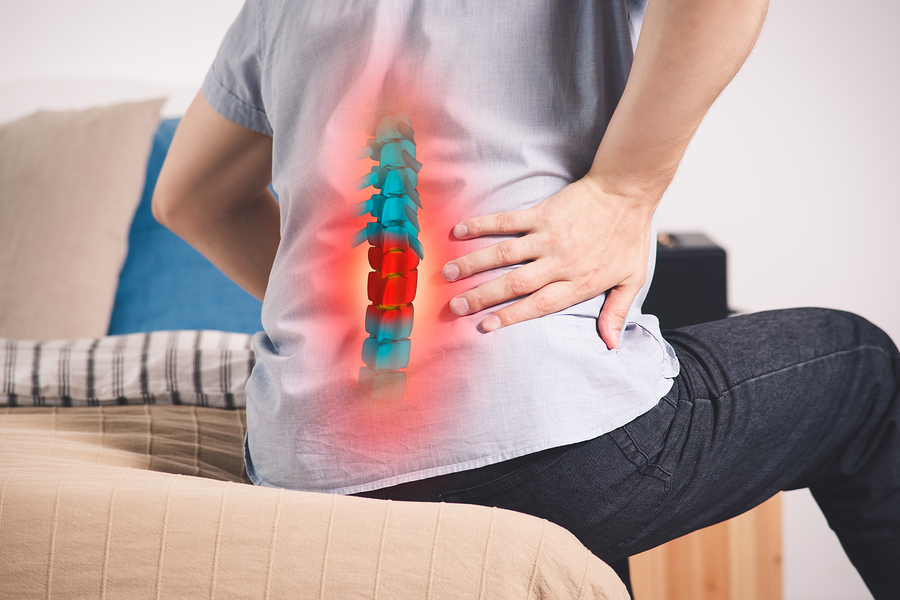Slipped discs – all you need to know
A slipped disc can be painful and recovery can take a while - here we look main causes, symptoms, treatment and prevention
The vertebrae in your back are separated by spinal discs which are tough on the outside but have a gel-like centre. If the outside structure of the discs splits the gel can bulge out and this is known as a slipped, herniated or prolapsed disc.
A slipped disc can put pressure on the spinal cord and can either affect one or multiple nerves resulting in back pain or sometimes pain in the area of the body that the affected nerve controls.
Recovery usually takes between one and three months and the majority of slipped discs recover normally as the spinal disc shrinks back to its usual position and ceases pushing on the nerve. But occasionally the disc can keep pressure on the nerve causing the brain to ignore the pain signal.
Slipped disc – causes
Unfortunately one of the main causes of slipped discs is age as our discs begin to degenerate through wear and tear. But equally other causes of a slipped disc can be as a result of:
- Injury through lifting or bending in an awkward way or damaging your back in an accident
- Being overweight as this can put more strain on your back
- Smoking which can cause spinal discs to lose their agility
- Not exercising
- Participating in sports which include a lot of heavy weights
Slipped disc – symptoms
A slipped disc may result in any or all of the following symptoms:
- Lower back pain but may also occur in the neck. If the slipped disc is pressing on the sciatic nerve there may be pain in the hips and legs too
- Tingling or numbness in your arms, legs and shoulders
- Muscles feeling weak
- Difficulties with bending or straightening your back
Relaying the symptoms you are experiencing to your doctor is vital as they may not always correspond with what is shown on a scan. Equally, some people can have a slipped disc without showing any symptoms at all. Your GP will generally diagnose a slipped disc by examining you and they can also undertake further scans including MRI which provide a more detailed image of the body.
Slipped disc – treatment
The first thing to do if you are suffering from a slipped disc is to get plenty of rest. Further treatment includes:
- Gentle exercise that won’t put too much strain on the back
- If the pain is intense then it can be managed with over the counter pain killers such as paracetamol or ibuprofen or a mixture of the two
- Heat packs or a TENS machine may help with discomfort
- Physiotherapy
- And in rare cases pain relieving injections or surgery
Slipped disc – prevention
To prevent a slipped disc occurring in the first place you should aim to:
- Undertake regular exercise
- Maintain good posture and back strength
- Lift using the correct techniques
- Keep a healthy weight for your height
- Quit smoking
If you suspect you have slipped a disc then make an appointment to see your GP practice as soon as possible so they can make a diagnosis and assess which treatment is most appropriate for you.
Click here to see 5 exercises for a healthy back.
Disclaimer
All content on Silversurfers.com is provided for general information only, and should not be treated at all as a substitute for the medical advice of your own doctor or any other health care professional. Silversurfers will not be responsible or liable for any diagnosis made by a user based on the content on www.silversurfers.com and we are also not liable for the content of any external websites or links from or to Silversurfers to any other websites. Please always consult your own doctor if you’re in any way concerned about any aspect of your health
Melina - Assistant Editor
Latest posts by Melina - Assistant Editor (see all)
- Cream Cheese Orange Bars - May 2, 2024
- Top tips for hay fever sufferers - April 14, 2024
- Paysan Breton Cream Cheese Breakfast Wraps - April 12, 2024
- 4 Homemade Sweet Treats for Easter - March 24, 2024
- Playground Memories - March 10, 2024





















